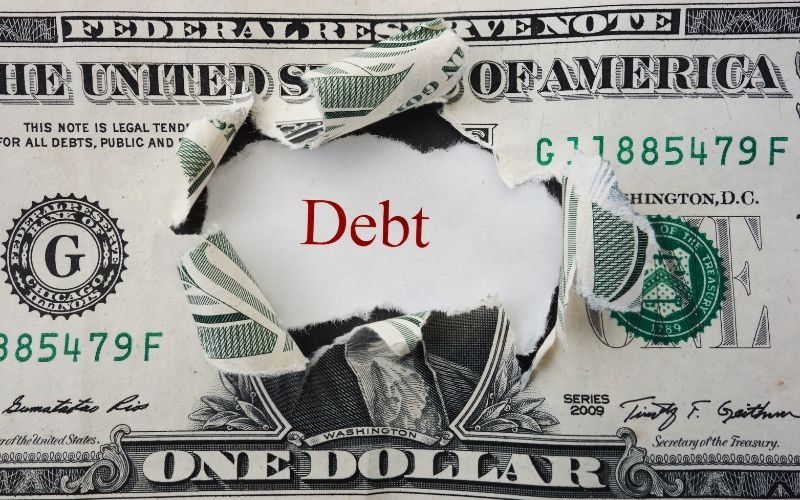Last Updated: April 2, 2024
A Closer Look at America's Most Indebted Cities

Disclaimer: We are not qualified legal or tax professionals and are not giving advice. Always speak with a qualified professional before making any legal or financial decisions.
In a remarkable turn of events, Americans have begun to chip away at the mountain of credit card debt accumulated over recent years. Despite a pandemic-induced reduction in spending and a subsequent decrease in overall debt, the return to pre-pandemic spending habits has seen debt levels creeping back up.
This blog post dives into the top 5 US cities grappling with the highest credit card debt, revealing a mix of historical spending patterns and recent efforts to reduce these burdens.
Join us as we explore the intricacies of credit card debt across the nation, shedding light on both the challenges and successes faced by individuals in these cities.
Want to skip the article and speak directly to a debt specialist? Click here for a free consultation.
Top 5 Cities
- San Antonio, TX
- Jacksonville, FL
- Atlanta, GA
- Honolulu, HI
- Dallas, TX
Experian's study analyzed data across major metropolitan areas to determine the cities with the highest average credit card balances. The data provides insight into the financial struggles facing many households today.
In addition to the top 5 cities for credit card debt, this article reveals that a recent Equifax study found that the average US consumer carries a balance of $4200 per month on their credit cards and that a typical household is paying close to 17% of their income towards their credit card balances. Collectively, Americans owe over $800 BILLION in credit card debt. We have a number of other articles on managing credit card debt that may provide helpful tips.
Why do these 5 cities have high levels of credit card debt?
San Antonio, TX
San Antonio has lower average incomes compared to other major metros. This makes it harder for households to keep up with credit card payments. The city was also hit hard by the housing crisis.
Jacksonville, FL
Like other cities in Florida, Jacksonville was severely impacted by the housing crisis. Foreclosures were common, causing financial hardship. The city also attracts many retirees living on fixed incomes.
Atlanta, GA
Atlanta was impacted by job losses during the recession. Unemployment rose, making credit card debt more unmanageable. The city also attracts recent college graduates with student loan debt.
Honolulu, HI
The high cost of living in Honolulu including housing, food, and utilities makes it difficult not to rely on credit cards to cover expenses. Tourism industry downturns also lead to job losses.
Dallas, TX
Dallas has experienced rapid economic and population growth, but wages aren't keeping up with the increased cost of living. Property taxes and home prices are rising quickly.
Causes of High Credit Card Debt
Job loss or income reduction
This can make it difficult to keep up with credit card payments.
Overspending
Swiping the credit card for non-essential purchases adds up over time.
Lack of emergency savings
Without savings, credit cards get used for unexpected expenses.
High-interest rates
Carrying a balance month-to-month leads to growing interest charges.
Medical bills
Unpaid medical bills may end up on credit cards.
Impact of High Credit Card Balances
Carrying high credit card balances can negatively impact your finances in several ways:
- Your credit score may decrease making it harder to get approved for loans/credit.
- More of your income goes towards paying interest charges rather than other goals.
- You may exceed your credit limit incurring penalty fees.
- Calls from debt collectors become more frequent.
- Bankruptcy may feel like the only option.
Tips for Managing High Credit Card Debt
Create a budget
Track your income and expenses to get a clear picture of where your money is going each month. Look for areas to cut back on discretionary spending.
Pay more than the minimum
Paying the minimum only covers a fraction of your balance and interest each month. Pay as much extra as you can afford.
Consolidate debt
Transfer balances to a 0% APR card or take out a debt consolidation loan at a lower interest rate to save money. Be aware of the statute of limitations on credit card debt in your state.
Talk to creditors
Contact your creditors directly to negotiate lower interest rates or alternate repayment plans.
Consider debt settlement
Debt settlement programs can help negotiate settlements for a fraction of your balance. This may be an option if your debt is unmanageable.
If you find yourself in over your head with credit card debt and are carrying a balance of $10,000 or more, please call us today at 1-877-722-3328 for a free analysis of your situation. Our debt consultants will go through your options and determine if our NO UPFRONT FEES debt settlement program is appropriate for your situation.
FAQs
Conclusion
High credit card debt is an immense problem facing many American households, especially in cities like San Antonio, Jacksonville, Atlanta, Honolulu, and Dallas. If you are feeling overwhelmed, nonprofit credit counseling provides free assistance. Address the problem soon, and you can put yourself on track to reduce balances, improve your credit, and regain your financial footing. For more tips on managing credit card debt, check out our other articles on controlling credit card debt.
It will take time and diligent effort, but with the right financial behaviors, individuals can reduce their credit card balances, increase savings, boost credit scores, and regain their financial footing. The path to a debt-free life begins with reaching out for assistance and making a plan. There are resources available, so the first step is to make the commitment to seek help and start actively reducing your high credit card balances.
If you are struggling with overwhelming debt and want to explore your relief options, Pacific Debt Relief offers a
free consultation to assess your financial situation. Our debt specialists can provide objective guidance to help find the right debt relief solution.
For more information and Credit Card Tips please visit our Credit Card Resources page
*Disclaimer: Pacific Debt Relief explicitly states that it is not a credit repair organization, and its program does not aim to improve individuals' credit scores. The information provided here is intended solely for educational purposes, aiding consumers in making informed decisions regarding credit and debt matters. The content herein does not constitute legal or financial advice. Pacific Debt Relief strongly advises individuals to seek the counsel of qualified professionals before undertaking any legal or financial actions.
Reduce Your Credit Card Debt By Up to Half

BBB Reviews | 4.9/5.0 Rating









 Do Not Sell My Personal Information
Do Not Sell My Personal Information